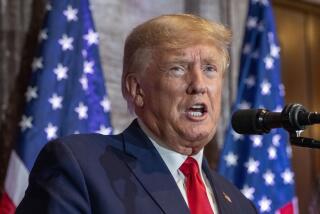Justices to rule on detainee lawsuit
WASHINGTON — The Supreme Court came to the aid of former Atty. Gen. John Ashcroft on Monday by agreeing to hear his claim that he and other high-level Bush administration officials are shielded from being sued by immigrants who say they were rounded up, abused and beaten after the attacks of Sept. 11, 2001.
The court’s move stops for now a lawsuit by a Pakistani man who was held for nearly six months in solitary confinement in New York.
The justices voted to decide whether the president’s top appointees are immune from lawsuits growing out of their response to “an unprecedented national security crisis.”
After the Sept. 11 attacks, hundreds of immigrants, nearly all of them Muslim men, were taken into custody and questioned. Officials feared then that the Al Qaeda terrorist network could have “sleeper cells” in the United States, and that these operatives might have been planning more attacks.
As the head of the Justice Department, Ashcroft ordered the FBI to move aggressively and to use all available legal means to question suspects and gather intelligence.
The government held most of the immigrants on charges that they had violated immigration laws by, for example, overstaying their visas.
Javaid Iqbal, the plaintiff who sued Ashcroft, was arrested at his Long Island home on Nov. 2, 2001. Two months later, he was put in solitary confinement.
He said at one point he was taken into a room where 15 officers were waiting. He was thrown against the wall, kicked in the stomach and punched in the face, he said. All the while, the officers screamed at him, calling him a terrorist and a Muslim.
Iqbal said the abuse continued for several months. He was eventually cleared of any connections to terrorism, but he pleaded guilty to a fraud charge and was deported to Pakistan in 2003.
He then sued Ashcroft, FBI Director Robert S. Mueller III and several other officials, alleging they had violated his constitutional rights by singling out Muslim men for arrest because of their religion and nationality and for abusing them in custody.
Government lawyers said the suit should be dismissed, but a federal judge in Brooklyn and the U.S. court of appeals in Manhattan refused to do so. The judges said Iqbal’s allegations, if true, would amount to a violation of the Constitution. And they said his lawyers should be permitted to move forward and to question Ashcroft and Mueller under oath.
To win his lawsuit, Iqbal would have to show that the two top officials were responsible for his mistreatment.
In February, Bush administration lawyers appealed to the Supreme Court and said the suit against Ashcroft and Mueller should be halted.
They said Cabinet officers should not face the threat of “crippling personal liability” for their official actions, especially when they were “charged with responding to an extraordinary national security crisis like the Sept. 11 attacks.”
In Monday’s order, the court said it would hear the case of Ashcroft and Mueller vs. Iqbal in the fall.
--
More to Read
Get the L.A. Times Politics newsletter
Deeply reported insights into legislation, politics and policy from Sacramento, Washington and beyond. In your inbox three times per week.
You may occasionally receive promotional content from the Los Angeles Times.











